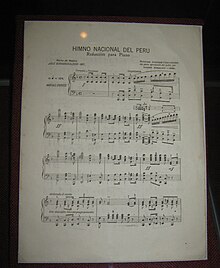เพลงชาติเปรู
| คำแปล: เพลงชาติเปรู | |
|---|---|
 สกอร์เพลงชาติเปรู | |
| ชื่ออื่น | Somos libres, seámoslo siempre |
| เนื้อร้อง | โฆเซ เดอลา ทอเรย์ อูกาเตร์ and ดิเอโก มาริซิโอ คราสโตร โซโต |
| ทำนอง | โฆเซ เบอร์นาโด อัลเซโด |
| รับไปใช้ | ค.ศ. 1821 |
| ตัวอย่างเสียง | |
เพลงชาติเปรู (บรรเลง) | |

เพลงชาติเปรู (สเปน: Himno Nacional del Perú หรือ Somos libres, seámoslo siempre "เราเป็นอิสระ ขอให้เป็นเช่นนั้นตลอดไป") ประกาศใช้อย่างเป็นทางการ เมื่อ ค.ศ. 1821
ประวัติ[แก้]

ส่วนนี้รอเพิ่มเติมข้อมูล คุณสามารถช่วยเพิ่มข้อมูลส่วนนี้ได้ |
หลังจากที่เปรูได้ทำการประกาศอิสรภาพ, นายพลโฮเซ เด ซาน มาร์ติน ได้จัดให้มีการประกวดเพลงประจำชาติ (National March), และ ได้ประกาศลงในหนังสือข่าวราชการที่มีชื่อว่า Gaceta Ministerial (Ministerial Gazette) เมื่อวันที่ 7 สิงหาคม ค.ศ. 1821 โดยมีผู้ประพันธ์เนื้อเพลงส่งเข้าประกวด มาจากหลายหลายวงการ เช่น นักกวี, นักเรียบเรียง และผู้สนใจที่เข้าร่วมประกวด, และต้องส่งบทร้องที่ประพันธ์ขึ้น ไปยังกระทรวงแห่งรัฐก่อนวันที่ 18 กันยายน ในที่ตัดสินและประกาศผลนั้น บทร้องที่ได้รางวัลชนะเลิศ บทร้องดังกล่าว มีการประกาศใช้เป็น "เพลงประจำชาติ" ผู้ประพันธ์ที่ชนะเลิศ ทางรัฐบาลมีการประกาศเกียรติคุณ และเชิดชูเกียรติ
ค.ศ. 1901 ได้มีคำสั่งจากประธานาธิบดี เอดูอาร์โด โลเปซ เดอ โรมานา ให้มีการประพันธ์บทร้องใหม่เฉพาะสี่บทแรก โดยนำบทกวีของ โฆเซ ซานโตส โชกาโน ในบทแรกมีเนื้อหากล่าวถึงนายพลโฮเซ เด ซาน มาร์ติน ผู้สถาปนาประเทศเปรู และซิมอน โบลีบาร์ ผู้ปลดปล่อยอเมริกาใต้ มาขับร้องแต่ไม่ได้รับความนิยมเท่าที่ควร จนถึง ค.ศ. 1913 ได้มีการกลับไปใช้บทร้องเดิม[1]
เนื้อร้อง[แก้]
ฉบับโฆเซ ซานโตส โชกาโน[แก้]
| เพลงชาติเปรู (บทกวีของ โฆเซ ซานโตส โชกาโน) | |
|---|---|
| ภาษาสเปน | คำแปล |
| บทที่ 1 | |
|
|
| บทที่ 2 | |
|
|
| บทที่ 3 | |
|
|
| บทที่ 4 | |
|
|
ฉบับราชการ[แก้]
| ภาษาสเปน | คำแปล |
|---|---|
บทประสานเสียง
| |
Somos libres |
พวกเราเป็นอิสระ ! |
บทที่ 1 (บทร้องฉบับเดิม)
| |
Largo tiempo el peruano oprimido |
ชาวเปรูถูกกดขี่เป็นเวลามาเนิ่นนาน |
บทที่ 2
| |
Y al estruendo de broncas cadenas |
Now the roar of rough chains |
บทที่ 3
| |
Con su influjo los pueblos despiertan |
With its influx the peoples woke up, |
บทที่ 4
| |
Lima cumple ese voto solemne, |
Lima fulfilled this solemn vow, |
บทที่ 5
| |
Compatriotas, no más verla esclava. |
Countrymen, may we see it a slave no more. |
บทที่ 6
(บทที่ 5 ของเนื้อร้องเดิม) | |
Excitemos los celos de España |
May we arouse the jealousy of Spain |
บทที่ 7
(บังคับใช้เป็นบทร้องฉบับราชการ) | |
En su cima los Andes sostengan |
จะรักษาบนเทือกเขาแอนดิสที่สูงที่สุด |
บทร้องใหม่ ค.ศ. 1959 เฉพาะบทแรก แต่ไม่ได้มีการขับร้องจริง:
(ประพันธ์โดย ราอูล ปอร์ราซ บาเรเนชเช่, ชาบูชา แกรนดา) | |
Gloria enhiesta en milenios de historia |
Glory erected in millenia of history |
บทร้องภาษาพื้นเมือง[แก้]
ส่วนนี้รอเพิ่มเติมข้อมูล คุณสามารถช่วยเพิ่มข้อมูลส่วนนี้ได้ |
| ภาษาเกชัว | ภาษาเกชัว (ร่วมสมัย) | ภาษาอัยมารา | ภาษาอวาจุน | ภาษาอาชฮานินคา |
|---|---|---|---|---|
บทประสานเสียง
| ||||
Qispisqañam kachkanchik |
Qespichisqan kanchis |
Munañanitanwa ukhamañani |
Anchajamarsi tucojnisi |
Añaguero saycanche |
บทที่ 1
(บทร้องฉบับเดิม) | ||||
บทที่ 6
(บทที่ 5 ของเนื้อร้องเดิม) | ||||
บทที่ 7
(บังคับใช้เป็นบทร้องฉบับราชการ) | ||||
Achka watam piruwanu sarusqa, |
Llaqta runan unay wata mat'isqa |
Qullupatxaru apxaruyañani |
Qullupatxaru apxaruyañani |
saycacota croquishi croquiero |
สื่อ[แก้]
ดูเพิ่ม[แก้]
อ้างอิง[แก้]
เชิงอรรถ[แก้]
บรรณานุกรม[แก้]
- ↑ "เพลงชาติเปรู - เพลงชาติมหากาพย์แห่งละตินอเมริกา". country.myfirstinfo.com. คลังข้อมูลเก่าเก็บจากแหล่งเดิมเมื่อ 2013-03-27. สืบค้นเมื่อ 2013-03-27.
{{cite web}}: CS1 maint: bot: original URL status unknown (ลิงก์)
แหล่งข้อมูลอื่น[แก้]

